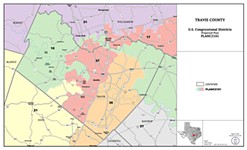Meanwhile, at the Supreme Court ...
By Mike Clark-Madison, Fri., Dec. 19, 2003
Frankly, the Democrats' chances in Vieth are pretty slim. They're asking the Supremes to elaborate on their 1986 ruling (in Davis v. Bandemer, from Indiana) that partisan gerrymandering can violate the 14th Amendment if one group of voters (in Bandemer, Democrats) is systematically disenfranchised over the long term. They didn't think this had actually happened in Indiana, and every lower court that has heard a Bandemer case since, including the district court that first heard Vieth, has interpreted "systematic" to mean shutting a party's voters out of politics entirely -- not just at the ballot box, but from any means of influence. (Only voters, as opposed to the parties themselves and their officeholders and candidates, have "justiciable" 14th Amendment rights in this context.)
And thus Bandemer has gathered dust, which is why Texas GOP lawyers can use "partisan gerrymandering" as a defense of Tom DeLay's handiwork. Every Supreme Court redistricting case since (and there have been many) has involved the Voting Rights Act and questions of race. If Texas can convince the courts, and even the Supreme Court, that it just wanted to give the Democrats a good screwing -- and not to disenfranchise black and brown voters, even though those voters are almost all Democrats, or to create districts solely defined by race, even though they more-or-less admit having done so -- the new map may be home free.
The plaintiffs in Vieth want the Supremes to offer a test that courts can use to gauge if a redistricting plan violates Bandemer, just as the Supremes have provided in VRA cases. Unfortunately for Texas Democrats, the proposed Vieth test is "majoritarian," premised on Pennsylvania's being a Democratic state, which would seem to make the current Texas map, not the new one, unconstitutional. For its part, the Texas House Democratic Caucus (the "Killer D's"), in its amicus brief filed in Vieth, avoids any claim that Texas Democrats "deserve" more seats than the new map would offer them. It simply argues that the politics of redistricting have gotten so ugly -- using Texas as Exhibit A -- that the Supreme Court has to step in with some ground rules (a "predominant circumstances" test) to help people play nice, and that the same "traditional principles" the court has referred to in racial redistricting cases (contiguity, compactness, communities of interest, etc.) would be a good place to start.
This is what John Paul Stevens has argued for years, even before Bandemer -- in a 1983 dissent he wrote that redistricting plans with "no purpose other than to favor one segment -- whether racial, ethnic, religious, economic, or political" violate the 14th Amendment. Stevens, who along with Stephen Breyer appeared most sympathetic to the Vieth plaintiffs, is the only remaining justice who concurred with the Bandemer decision. On the other side in 1986 were William Rehnquist and Sandra Day O'Connor, who argued there is simply no constitutional right of Democratic voters to elect Democrats to office and that even Bandemer's faint suggestion otherwise starts the republic on a slippery slope toward guaranteed proportional representation. O'Connor has not changed her mind, telling the Vieth plaintiffs that the lack of lower-court acceptance of Bandemer proves it was a bad decision.
O'Connor and Stevens have been the court's most vocal members in past redistricting cases, reliably on opposite sides, despite O'Connor's swing-vote reputation. Which raises the possibility that the Supremes took Vieth precisely to wipe Bandemer off the books, making clear that unless you're alleging racial bias in redistricting, you might as well save your legal fees. That doesn't necessarily help the chances of the Texas GOP; the new map commits all manner of sins against which both O'Connor and Stevens have inveighed in the past. But partisanship itself may not be one of them.
Got something to say on the subject? Send a letter to the editor.










